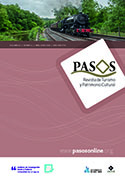The privileges of the private sector and the developmental discourse of tourism. Analysis of the international and Colombian context
DOI:
https://doi.org/10.25145/j.pasos.2024.22.022Keywords:
Tourism, Development, Discourse, State, ColombiaAbstract
The growth of tourism at the international level is the highest in history. As a result, the institutional framework of this activity has positioned a discourse that makes tourism be seen as a source of development for the territories, but what is proposed in the study is that in reality this discourse hides a series of economic interests. Thus, the objective of this article is to identify the economic and political interests that are found within tourism policies or in the developmentalist discourse of tourism. To this end, a critical analysis of the discourse of legislation and official information from institutions at different scales of geographic incidence is carried out. The main result is that support for the economic interests of some central actors is disguised through a series of social ideas that in reality are not fulfilled. In this sense, the contribution and originality of the work focuses on the methodological approach applied from the critical analysis of the discourse to official documents of organizations that lead tourism, to show that there are some interests that are being favored there.
Downloads
Publication Facts
Reviewer profiles N/A
Author statements
- Academic society
- PASOS. Revista de Turismo y Patrimonio Cultural
- Publisher
- Instituto Universitario de Investigación Social y Turismo. Universidad de La Laguna (España) - Instituto Universitario da Maia ISMAI (Portugal)
References
Acerenza, M. (2006). Conceptualización, origen y evolución del turismo. Trillas.
Banco Mundial. (2016). Turismo internacional, número de arribos. https://datos.bancomundial.org/indicador/ST.INT.ARVL
Baños, J. A. (2007). Segregación Residencial en el Espacio Turístico de Puerto Vallarta, Jalisco: 2001-2007. Universidad de Guadalajara.
Bauman, Z. (2007). Vida de consumo. Fondo de Cultura Económica.
César, A., Arnaiz, S. y César, F. (2017). Capitalismo, sociedad y turismo. Universidad de Guadalajara.
Chávez, T. (2019). El turismo como instrumento de colonización neoliberal: una perspectiva foucaultiana. Dimensiones Turísticas, 3(4), 110–116.
Cordero, A. (2006). Nuevos ejes de acumulación y naturaleza. El caso del turismo. http://biblioteca.clacso.edu.ar/clacso/becas/20110205114102/cordero.pdf
Cruz, E., Zizumbo, L., Cruz, G., & Quintanilla, A. L. (2012). Las dinámicas de dominación capitalista en el espacio rural: la configuración de paisajes turísticos. Cuadernos de Desarrollo Rural, 9(69), 151–174.
Escobar, A. (2007). La invención del Tercer Mundo: Construcción y deconstrucción del desarrollo. Fundación Editorial el perro y la rana.
Gaviria, M. (1974). La producción neocolonialista del espacio. Revista de Sociología, 3, 201–217.
Gotham, K. F. (2005). Tourism Gentrification: The Case of New Orleans’ Vieux Carre (French Quarter). Urban Studies, 42(7), 1099–1121.
Harvey, D. (1998). La condición de la posmodernidad: investigación sobre los orígenes del cambio cultural. Amorrortu.
Harvey, D. (2005). El “nuevo” imperialismo: acumulación por desposesión. Socialist Register, 2004, 99–129.
Latiesa, M. y Álvarez, A. (2000). Turismo fordista y postfordista: Una primera aproximación a la operativización de conceptos. El turismo en la sociedad contemporánea: Diversificación, competitividad y desarrollo. Ed. Urbano.
López, Á., y Marín, G. (2010). Turismo, capitalismo y producción de lo exótico: una perspectiva crítica para el estudio de la mercantilización del espacio y la cultura. Relaciones. Estudios de Historia y Sociedad, 31(123), 219–260.
Méndez, B. A. (2015). Acapulco: del Paraíso turístico al desastre. Revista Geográfica Del Sur, 6, (9), 28‐43.
Ministerio de Comercio Industria y Turismo. (2018). Plan Sectorial de Turismo 2018-2022: turismo el propósito que nos une. Ministerio de Comercio Industria y Turismo.
Muñoz, E. (2017). Territorio de postal: la dualidad del turismo en Santa Fe de Antioquia (Colombia). Cuadernos de Geografía: Revista Colombiana de Geografía, 26, (2), 153–174. https://doi.org/10.15446/rcdg.v26n2.59237
Muñoz, E. (2018). Procesos de territorialización de la globalización a través del turismo. Análisis de las relaciones global-local que promueve este fenómeno. El Ágora USB, 18, (2), 557–572. https://doi.org/10.21500/16578031.3835
Nussbaum, M. (2016). Crear capacidades. Propuesta para el desarrollo humano. Paidós
Organización Mundial del Turismo (2001). Código Ético Mundial para el Turismo: por un turismo responsable. OMT.
Organización Mundial del Turismo. (2016). Documentos básicos de la OMT. Volumen I - Estatutos, reglamentos, acuerdos. OMT.
Organización Mundial Del Turismo. (2019). Miembros Afiliados. https://www.unwto.org/es/affiliate-members
Segeur, S. (2015). Nuevas urbanizaciones costeras, ¿gentrificación turística en la bahía de Coquimbo? Revista de Urbanismo, (32), 18–31.
Sen, A. (2015). Desarrollo y Libertad (Edición 13). Planeta.
Solano, M., Pérez, A., Torralba, A., & Riquelme, P. (2017). ¿Turismo para todos? Revisión crítica a política turística mexicana: el caso de Ixtapa Zihuatanejo. International Journal of Scientific Management and Tourism, 3(2), 219–236.
Spillane, J. (2005). Tourism in Developing Countries: Neocolonialism or Nation Builder. Management and Labour Studies, 30(1), 7–37. https://doi.org/10.1177/0258042X0503000101
Valenzuela, E. y Coll-Hurtado, A. (2010). La construcción y evolución del espacio turístico de Acapulco (México). Anales de Geografía, 30, 163–190.
Van-Dijk, T. (1998). Ideología. Una aproximación multidisciplinaria. Editorial Gedisa.
Van-Dijk, T. (2009). Discurso y poder. Contribuciones a los estudios críticos del discurso. Editorial Gedisa.
Van Dijk, T. (2016). Análisis Crítico del Discurso. Revista Austral de Ciencias Sociales, (30), 203–222. https://doi.org/10.4206/rev.austral.cienc.soc.2016.n30-10
Downloads
Published
How to Cite
Issue
Section
License
Copyright (c) 2023 Elkin Muñoz Arroyave, Alexandra López Martínez, Adriana María Flórez Laiseca

This work is licensed under a Creative Commons Attribution-NonCommercial-NoDerivatives 4.0 International License.
I confirm that the work is original (of my/our authorship), and that it will not be submitted to other journals or publications until the final resolution of the review process in PASOS, RTPC.
I authorize the publication of my work by PASOS, PSTN of free and open access in any of the formats that I deem appropriate, for an indefinite period of time and as a non-remunerated collaboration.
Likewise, the author(s) understands that the published work may be linked or deposited on any server or included in other publications (republication), provided that the new place and/or new edition references the original publication and acknowledges the authorship and copyright ownership of PASOS RTPC publications.
Authors understand that a plagiarism-self-plagiarism check will be performed, and the article may be removed at any time from the editorial flow.










